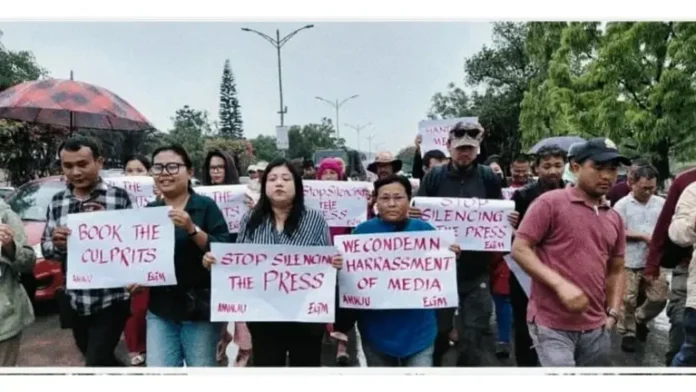
Fresh unrest has erupted in Manipur following an intense Army action in Manipur, aimed at flushing out insurgent elements in the state’s conflict-prone regions. The incident has triggered widespread civil protests, road blockades, and community outrage, marking a new phase of tension in the already fragile state.
According to local sources, the Army action Manipur involved night-time raids and alleged detentions, which residents claim were excessive and indiscriminate. As the news spread, angry citizens poured onto the streets, demanding accountability and a halt to aggressive tactics.
Read More: Arunachal Adopts Mission Karmayogi to Train Civil Servants
Civilian Outrage Over Alleged Excesses
Eyewitnesses in the affected areas reported that the Army carried out a series of house-to-house searches, leading to detentions of several local youth. Many families claim their homes were raided without prior warning, while others say force was used disproportionately.
In response, civil society groups, local tribal organizations, and student unions called for immediate protests, accusing the Army of violating human rights. Demonstrators carried banners and chanted slogans, demanding a judicial inquiry into the incident.
The Manipur Human Rights Commission has taken cognizance of the matter, issuing notices to both the state government and Army officials. Meanwhile, the unrest continues to spread beyond the immediate conflict zone, raising concerns over law and order.
Political Leaders Call for Restraint
Political parties and community leaders across the spectrum have urged restraint on both sides. While condemning insurgency-related violence, they have also criticized what they see as military overreach in civilian areas.
Former Chief Minister Okram Ibobi Singh stated that “national security cannot come at the cost of innocent lives and dignity.” He called for a balanced approach that ensures both safety and civil rights.
Meanwhile, Chief Minister N. Biren Singh appealed for calm, assuring citizens that the government would investigate the matter thoroughly. He said the state remains committed to peace and will work with security forces to prevent escalation.
Army Defends Its Actions
In an official statement, the Indian Army defended the operation, claiming it was based on credible intelligence of insurgent activity. The statement clarified that the action targeted “hardened militants” involved in previous attacks on security personnel.
Army officials added that they followed standard operating procedures and exercised restraint during the operation. However, they acknowledged civilian distress and assured cooperation with any impartial investigation.
They also confirmed that several individuals were detained for questioning and that no civilian fatalities occurred during the raid.
Despite the clarification, local anger remains high, particularly in Imphal, Churachandpur, and Kangpokpi districts, where the protests have intensified over the last 48 hours.
Protests Disrupt Daily Life Across the State
Massive demonstrations have blocked highways, disrupted public transport, and closed down government offices in many areas. Students have boycotted classes, and many marketplaces remain shut due to security fears.
Community groups have set up makeshift protest camps, vowing to continue their agitation until their demands are met. These include the release of all detainees, a public apology, and clear guidelines on military operations in civilian zones.
Social media platforms are flooded with videos of protests, alleged misconduct, and emotional appeals from family members of those detained. The situation has also drawn attention from national and international human rights groups.
Civil-Military Relations Under Strain
The latest developments have reignited debate over the role of the Armed Forces in internal security operations, especially in regions under the Armed Forces Special Powers Act (AFSPA).
While some argue the Army’s presence is vital to maintain order, others point to frequent civilian complaints and a lack of transparency in such actions.
Local activists say repeated incidents like these erode trust and worsen the gap between citizens and security forces. They demand greater oversight, judicial accountability, and the involvement of state police in future operations.
Path to Peace and Reconciliation
Experts believe that resolving the crisis will require open dialogue, transparency, and a human-centric approach. Community leaders have offered to mediate between the government and the agitating public.
The state administration has proposed forming an independent fact-finding committee to assess the ground reality and provide a clear timeline for resolution.
Peace-building workshops, counseling for affected families, and proactive communication from the government could help calm tensions. However, observers note that lasting peace will depend on how seriously authorities address community grievances and implement reform.
Restoring Trust and Stability
The Army action Manipur episode serves as a critical reminder of the need for sensitive handling of security operations in ethnically diverse and conflict-prone states. While national security is paramount, it must be balanced with respect for civil liberties and local sentiment.
As protests grow, the onus is on the government to provide clear answers, build public trust, and ensure such operations do not alienate the very people they aim to protect. For Manipur, the path forward lies in justice, transparency, and meaningful reconciliation.

